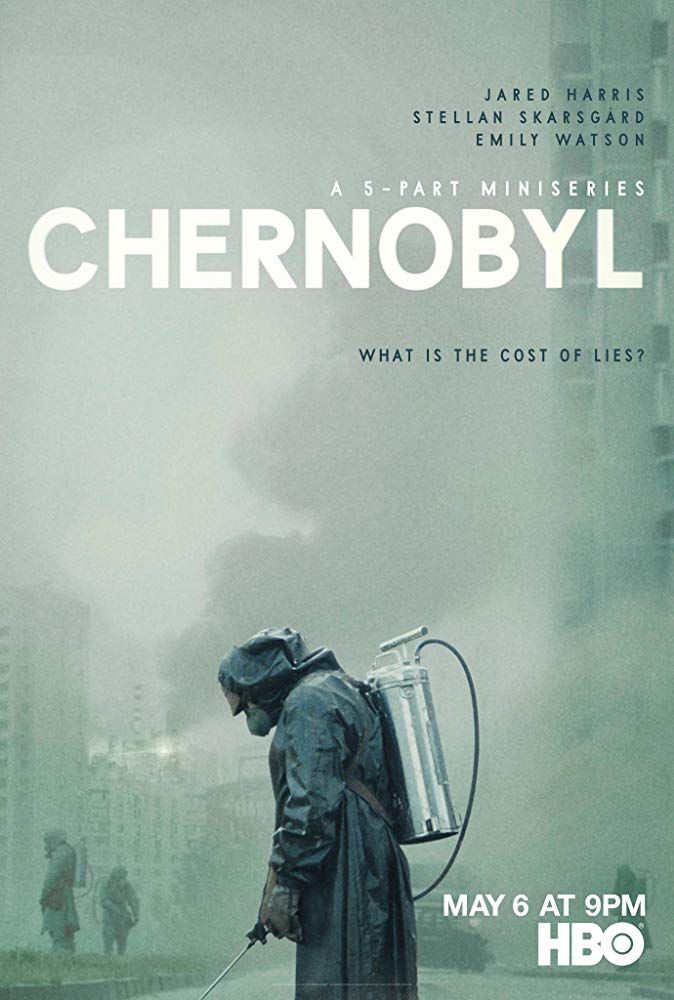Chernobyl Review (2019)

Striking and devastating, oppressive and depressing.
An incredibly heavy five-part film that everyone needs, just NEEDS to watch - a detached view from the outside of our, alas, history, based almost entirely on dry facts and eyewitness memories, with fictional fiction only in some details, admitted for the sake of a better storytelling. This is not horror, not a thriller, or even a forensic drama or detective story. This is a portrait of an entire country and an entire era - honest and impartial, without conventional heroes and villains, right and wrong. This is a film about ordinary people with broken destinies who, without hesitation, went to their deaths so that radiation would not wipe out entire countries, and about a state entangled in lies and omissions, infected with officialdom and the pretentious ideology of an unattainable common good, the very essence of which allowed such a tragedy …
"Chernobyl" - a live mini-series that recreates the atmosphere of the late USSR and the factual history of the monstrous technological catastrophe in Pripyat with incredible accuracy; a film shot by an American TV channel with European actors in English, restoring the picture of the Chernobyl nuclear disaster as accurately and honestly as possible for a work of art. And this applies to the smallest details - hairstyles, clothes, extra actors, interiors of Khrushchev houses and hospitals, party committees and laboratories. When you watch, even everyday scenes, it becomes creepy: it seems as if this is some kind of documentary or even a Soviet film, strangely filmed by the standards of cinema of 2019. Absolute stylization for the time of the narrative plus the director's techniques of our time - and tension, tension and doom in every scene, in the slightest movement. Here the old PAZiki are driving along the roads of the blooming Pripyat, boys in uniform and girls in aprons with briefcases go to school, young mothers are walking with strollers - nothing portends trouble. But at night, a pregnant firefighter's wife wakes up from a strange sound, her husband is called to extinguish the roof of the power plant - and in a week she will stand faceless among other widows at a mass grave with steel coffins, which will be slowly poured into concrete. And now her neighbors go out onto the bridge to admire the beautiful glow of the fire over the nuclear power plant - and their children are rejoicing at the falling "snow", from which the grass is withered and dead birds fall …
It's a fucking hard to watch at all levels, except artistic.
Nobody knows what is happening: The still living workers of the station go crazy, trying to fix the reactor (which is no longer there), those who go outside, turn red faces (circulatory disorders, "radioactive tan"), who received a lethal dose - rotting alive in hospitals … it's so hard to watch. The life of the liquidators is shown no less terribly: scuba divers, dumb and blind (flashlights are dying from radiation) wander in a flooded basement to stop the leak, volunteer "bio-robots" work for a minute and a half on the roof, cleaning it from fragments of graphite rods, earning themselves cancer , and a beardless boy in the company of cynical Afghans wanders through deserted villages to kill dogs and puppies, which they will also bury and fill with concrete, "Black ra-a-a-ven, why are you fly-y-y-ing" …

Every time I want to pause and ask: "Is this really how it was? But it's so fucked up! It couldn't be that way in real!"
You look on the Internet, check, - yes, and infected puppies were killed, and there was a stubborn grandmother, and Dyatlov worked for a military nuclear submarine and really could behave so fuckingly with subordinates, and the miners were really so cool that they could work naked, since the defense all the same, it's crappy and there is no ventilation so that radioactive dust is not raised, and the story of the fireman's wife in the series is reproduced almost literally from the book of the Nobel laureate, Belarusian writer Svetlana Aleksievich. Some events have been changed (Legasov did not appear in court against Dyatlov, the third main character, Ulyana Khomyuk, she was not, she is a collective image of Soviet women physicists, and the like), but basically, in general, this is true and at the same time - some then shock. "Chernobyl" is such an impartial civilized view of the Soviet way of life and psychology from the outside in the framework of one specific case of a catastrophe caused by a predictable error of the system; a look deliberately accurate in detail, in which everything is read - a kind of mirror reflecting both the past and the present, because bureaucratized power that has lost touch with reality is not only a Soviet and Russian phenomenon (Stephen King, impressed by the series, on Twitter has already compared Donald Trump with Mikhail Gorbachev , - which, by the way, in "Chernobyl" is shown at all and not caricatured).

And also great actors here. Even the extras - all the faces are so Russian, Soviet, one-on-one as in the dumb photos of your parents and their friends in their youth. And the main caste is very good: starring Jared Harris (Moriarty from "Sherlock Holmes" with Robert Downey Jr., villain obsessed with quantum teleportation from "The Edge", stubborn polar captain from "Terror") as a nuclear scientist Valeria Legasova and Stellan Skarsgard (scientist Eric Selvig from "The Avengers" and "Thor") in the role of the Kremlin apparatchik Shcherbina, real-life people summoned to the Ukrainian SSR in the middle of the night and stuck in a radiation-contaminated zone for several months, solving a problem with which still no one in the world has come across: how to extinguish a fire, the combustion products of which can kill the population of several countries. At first, warring people from different worlds - a tired of life, a cynical politician and an insecure scientist - in the face of incredible danger and a series of almost impossible engineering and physical tasks, rally and become almost friends, especially when they understand that the root cause of Chernobyl it was not a human error, not a reactor's shortcomings, and not even the whole series of unfortunate coincidences that led to the explosion of something that could not explode in any way. Legasov and Shcherbina come to the conclusion that the system of the Soviet state itself, where one design bureau does not know what the other is doing, and both solve the same problem (this is one of the reasons why the Soviet Union never sent a man to the moon, despite for serious success and primacy at the beginning of the space race with Gagarin and Leonov), - the system itself is completely false and only cripples people when it makes a mistake like it did on April 26, 1986. And when Legasov agrees to keep silent about the reactor's shortcomings during an international conference in Vienna, so as not to damage the prestige of Soviet science, he betrays himself and his principles, his screen character does not have the courage to go beyond the fear outlined by the party and the leader. And this is his tragedy: despite international recognition and indisputable merits, undermined health and saving thousands of lives that could have suffered if Pripyat had not been extinguished, isolation awaited Legasov in his homeland. He was removed from office, was not allowed to publish, in the eyes of the public a shadow of betrayal of the homeland, anti-Sovietism fell on him. And two years later Valery Legasov hanged himself.
… Heavy, but necessary, very important, as it seems to me, the series.
It leaves behind a heavy impression and arises in my head: how many such Chernobyls were there in history? Soviet, Russian … this is how much horror really lies behind the fact that we are used to not noticing, what we have forgotten about? At least after the collapse of the Union: Kursk, Beslan, Nord-Ost, the war with Georgia, Ukraine, Syria, the Central African Republic … all this is so scary. What will be written in history textbooks about our time and our country? How will our generation be remembered? And there is generally a future for him …





Comments